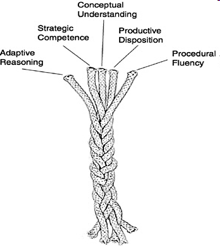Resources to complement the face to face meetings in January and February
“I don't expect, and I don't want, all children to find mathematics an engrossing study, or one that they want to devote themselves to either in school or in their lives. Only a few will find mathematics seductive enough to sustain a long term engagement. But I would hope that all children could experience at a few moments in their careers ... the power and excitement of mathematics ... so that at the end of their formal education they at least know what it is like and whether it is an activity that has a place in their future.”
David Wheeler
Guiding principles that inform the work of NRICH:

The Rope Model
Alan Wigley's article on Models for Teaching Mathematics
An example of what this might look like in practice:
Tilted Squares and the recording of a lesson
NRICH problems introduced to Year 10 students at Hautlieu School on first visit:
Unequal Averages
Summing Consecutive Numbers
Slick Summing
The Number Jumbler
Links to NRICH resources to support teachers
Links to sources of inspiration which were mentioned:
Peter Liljedahl's 14 Practices for Building Thinking Classrooms
Mindset: How you can fulfil your potential by Carol S Dweck
Colin Foster's Mathematical Etudes (Purposeful Practice)
Thinking Mathematically by John Mason et al.
Jo Boaler's work on Raising Achievement Through Group Worthy Tasks
Posters for the classroom.
Teachers can Register for our monthly email newsletter to be kept up to date with our latest news.
”A teacher of mathematics has a great opportunity. If he fills his allotted time with drilling his students in routine operations he kills their interest, hampers their intellectual development, and misuses his opportunity. But if he challenges the curiosity of his students by setting them problems proportionate to their knowledge, and helps them to solve their problems with stimulating questions, he may give them a taste for, and some means of, independent thinking.”
Polya, G. (1945) How to Solve it
